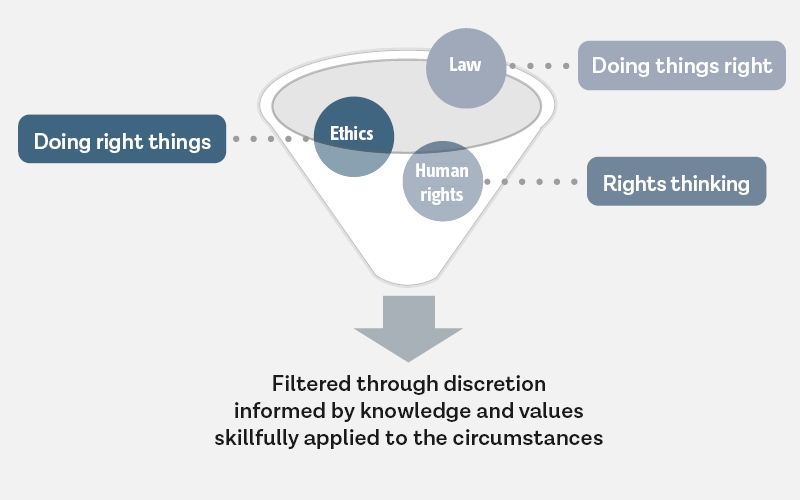Confidence and consciousness
What this means
Many people do not have the ‘know-how’ or confidence to challenge power or stand up for their rights. Building people’s confidence, sharing information, and practising transparency is one of the most effective ways to share power as equals. Part of this is empowering staff in direct work to be legally literate so they, in turn, can be clear on people’s rights and advocate for them.
It’s also worth remembering that there is a legal obligation in sharing power as equals - it’s there in the law, in Section 149 of the Equality Act 2010, by advancing ‘…equality of opportunity between persons who share a protected characteristic and persons who do not share it’. Protected characteristics include disability and age alongside race, gender identity, religion, marital status, religion, and sexual orientation.
It's also vital to make it crystal clear that there will be no penalties for people who speak out, stand up for their rights, or challenge power.
People may be reluctant to take action even when they have information and advice – this can be linked to the real fear that people will lose what they already have.
The research
All practitioners in adult social care require legal literacy in order to know and engage in social care legal rules (Braye & Preston-Shoot, 2021). Legal literacy is not simply about knowing what the law says - it’s about integrating the law, ethics, and human rights, into everyday practice. It looks like this:

(Braye & Preston-Shoot, 2021)
However, current legal literacy in the social care workforce is variable - with the law seen as ‘a hurdle to be overcome’, and a stress factor in people’s work, rather than as something to be used constructively (Braye & Preston-Shoot, 2021). This can lead to avoidance in considering the law, a lack of challenge to organisational procedures and decisions (particularly important when considering sharing power and supporting people’s rights) and, potentially, unlawful practice (Braye & Preston-Shoot, 2021).
Advocacy can be defined as a way to support people to understand their rights, assert them, and to strengthen people’s personal autonomy (Flynn, 2013). However, like legal literacy, current access to advocacy differs across England (Newbigging et al., 2021). There are also two different understandings of what advocacy is:
- ‘Law-based advocacy’ - a narrow definition, based on statutory obligations, and relating to relatively small numbers of people.
- ‘Value-based advocacy’ - a broad definition, and relating to most (if not all) people who access social care. Advocacy is more likely to be offered if this view is taken.
(Newbigging et al., 2021)
There is more information on advocacy in the Leading the lives we want to live section.
What you can do
If you are in direct practice: Think about transparency and legal literacy in the work you do. Are you confident in explaining the legal basis for your work – for instance, the Care Act 2014, the Mental Capacity Act 2005, the Human Rights Act 1998? Think how you would explain these laws to the people you work with – people with care and support needs and their carers and families. Research in Practice has a series of brief guides that you may find helpful when talking to people about their rights in, for example, assessment under the Care Act 2014 or the Mental Health Act 1983.
Part of legal literacy and rights-based thinking is making it clear that there is a legal basis from which people are entitled to support. As the research shows, people may be afraid of losing the support they have if they challenge things they are unhappy with (Equality and Human Rights Commission, 2023). Making it very clear that they have a legal entitlement to the support they receive can help allay these fears. You may find it useful to share SCIE’s Quick guide to eligibility outcomes under the Care Act 2014, for example.
It's important to always consider the transparency of the decisions you make, to enable people to understand them and to challenge them if they disagree with them. You may find this blog useful to help you apply a clear decision-making model to your work.
Reflect on the role of advocacy in the work you do. Is your understanding of it ‘value-based’, where you appreciate its wide use, rather than something seen as a purely legal requirement? Do you know who to contact, locally, to support people to access advocacy? What are your, and your team’s, relationships with local advocacy services? How can they be strengthened?
If you are a supervisor or manager: Consider how you can improve your team’s legal literacy and understanding of advocacy, and how you can promote exploration, discussion and reflection on the law and people’s rights.
Further information
Explore
Research in Practice has a series of resources on legal literacy in adult social care. These support practitioners and organisations to better use and promote legal rules in their work with adults.
Engage
Research in Practice publishes case law and legal summaries which will help you keep up with the latest developments in adult social care’s legal contexts. There is also an archive.
Rightsnet offers a broader daily news and case law update across welfare benefits, debt, housing, employment and community care.
Connect
The national charity VoiceAbility has several resources on advocacy and an instant chat messaging service available that enables you to connect with an advocate.
